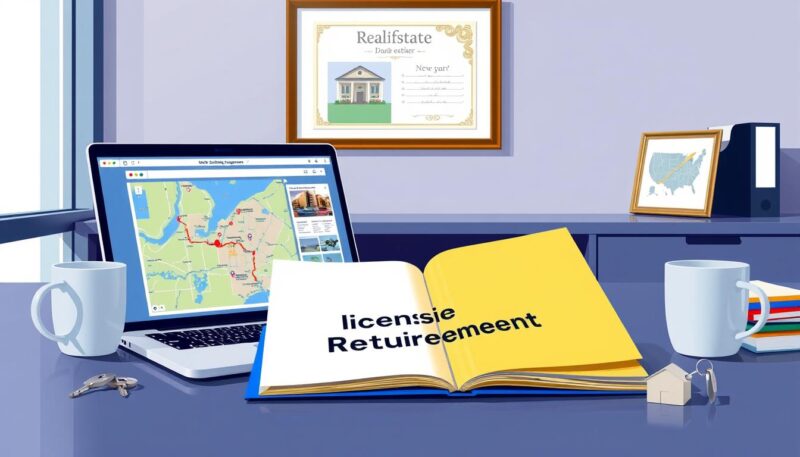Pursuing a real estate agent career can be an exciting venture for many individuals, particularly those eyeing a career change. If you’ve ever pondered whether you need a degree to become a real estate agent, the short answer is no—most states do not mandate a college degree. However, this doesn’t mean that education isn’t important or beneficial. While a formal degree can enhance your competitiveness in the market, the crucial element lies in completing state-required prelicensing education and passing the relevant exam. The real estate business offers diverse opportunities for earnings, often appealing to aspiring entrepreneurs looking to carve their niche in a rapidly evolving industry.
With just a few months of preparation, you can position yourself to enter this vibrant field. The landscape of real estate is broad, encompassing everything from residential sales to commercial property transactions. Your pathway to success will be shaped not just by your knowledge of the market, but also by the skills you develop and the specialized training you pursue. As we delve further into the essentials of beginning a career in real estate, you’ll discover how to navigate this promising career path even without a degree.
The Basics of a Real Estate Agent Career
A career as a real estate agent involves a dynamic blend of market knowledge, interpersonal skills, and strategic strategies. In this profession, agents facilitate transactions between buyers and sellers, wielding the essential real estate skills to guide their clients through the often complex world of property sales. You will engage in various responsibilities, including marketing properties, conducting property showings, negotiating contracts, and providing valuable insights to help clients make informed decisions.
What Real Estate Agents Do
Your role as a real estate agent centers on the facilitation of property transactions. Key tasks include:
- Conducting market research to determine property values.
- Creating listing presentations to attract potential buyers.
- Networking with other professionals, including mortgage brokers and appraisers.
- Guiding clients through the entire buying or selling process.
Skills Required for Success
To thrive in this competitive field, possessing strong real estate skills is crucial. Essential skills include:
- Effective Communication: Clearly conveying information helps in negotiations.
- Negotiation Skills: Advocating for your clients’ interests can lead to favorable outcomes.
- Organizational Abilities: Managing multiple listings and client communications requires excellent organization.
Earning Potential in Property Sales
The earning potential in this line of work heavily relies on commissions from sales. On average, agents earn around $56,408 annually; however, this figure can vary widely based on location, experience, and sales volume. Successful agents can significantly increase their income, especially in lucrative markets. Understanding the job qualifications and the specifics of real estate licensing will help you in navigating your career and maximizing your earning potential.
Do You Need a Degree to Be a Real Estate Agent?
Entering the real estate industry does not necessitate obtaining a college degree, although understanding licensing requirements is essential for success. Each state has specific prerequisites, including completing designated pre-licensing courses and passing state examinations. The journey to becoming a licensed agent offers opportunities for professional growth, regardless of formal educational achievements.
Understanding Licensing Requirements
Licensing requirements significantly vary across states. For example, the California Department of Real Estate mandates completion of at least three required courses to qualify for the salesperson exam. Applicants must complete 135 hours of pre-licensing coursework from an accredited institution or approved real estate school. The following are crucial components of these requirements:
- Applicants must be at least 18 years old with a Social Security number or ITIN.
- The three mandatory courses include:
- Real Estate Principles
- Real Estate Practice
- One additional course from a list (e.g., Real Estate Appraisal, Property Management).
- The required courses must consist of at least three semester units or four quarter units.
- Courses must be completed at accredited institutions or approved real estate schools.
Role of Education in Competitiveness
While a degree is not a prerequisite, possessing one may enhance your appeal in the job market. Statistics reveal that 31% of real estate agents hold a bachelor’s degree, and 12% have an associate’s degree. Continuous education in real estate or related fields such as finance can provide you with a competitive edge, facilitating better client interactions and understanding of financial complexities.
In summary, the job market trends within the real estate industry indicate that while formal education may not be necessary, investing in relevant courses and training can aid in professional growth and improve employment prospects.
| Requirement | Details |
|---|---|
| Minimum Age | 18 years old |
| Pre-Licensing Coursework | 135 hours required from accredited institutions |
| Required Courses | Real Estate Principles, Real Estate Practice, and one elective |
| Application Fees | $100 to $300 typically |
| Degree Requirement | No formal degree required |
Alternative Paths to Becoming a Real Estate Agent
Exploring career options as a real estate agent without a traditional degree can uncover various pathways tailored to your goals. Many individuals find success in the industry through alternative means such as internships, entry-level roles, and mentorship opportunities. Understanding how to navigate these avenues can be invaluable in building a solid foundation in real estate.
Gaining Experience without a Degree
Many successful real estate professionals have built their careers without a college degree. Opportunities exist to gain hands-on experience in the field through:
- Internships at real estate firms.
- Entry-level positions that allow you to learn the industry from the ground up.
- Mentorship programs where experienced agents guide you through the intricacies of the business.
Such practical exposure can enhance your job qualifications and prepare you for the realities of property transactions, even in competitive markets.
Importance of Specialized Training Programs
Specialized training programs play a crucial role in equipping you with the necessary skills for a successful real estate career. These programs are designed to supplement your knowledge beyond traditional educational pathways. They often cover topics such as:
- Market analysis and property evaluation.
- Legal regulations affecting real estate transactions.
- Financial literacy to navigate mortgage lending and investments.
With courses typically requiring between 60 to 135 hours for pre-licensing education, many programs are more affordable than traditional college degrees, making a career without a degree more accessible.
Certificates and Short Courses in Real Estate
Pursuing certificates in real estate can significantly enhance your professional standing. Various organizations offer certifications that demonstrate specialized knowledge and commitment to the field. Notable certifications include:
- Certified Commercial Investment Member (CCIM).
- Certified Residential Specialist (CRS).
These certificates and short courses provide focused learning opportunities tailored to specific market segments, enhancing your competitiveness in real estate. As you accumulate knowledge through these methods, your expertise will grow, giving you a clear edge in a dynamic industry.
| Program Type | Duration (Hours) | Focus Area |
|---|---|---|
| Pre-Licensing Education | 60 – 135 | Real estate principles, laws, and practices |
| Certificate Programs | Varies | Specialized knowledge in commercial or residential real estate |
| Continuing Education (e.g., Texas) | 18 (every 2 years) | Legal updates and industry trends |
By leveraging specialized training programs and obtaining relevant certificates, you can pave your way toward a flourishing career in real estate, all without the traditional requirement of a college degree.
Conclusion
In summary, pursuing a career as a real estate agent does not necessitate a college degree in the United States, including states like Texas, where the primary requirements focus on completing state-specific pre-licensing education and passing a licensing exam. Aspiring agents can often meet these requirements in a relatively short period—generally between 4 to 6 months—making this field an accessible entry point for many. While many successful agents choose to earn degrees in business, finance, marketing, or economics, the lack of a degree does not preclude your ability to thrive in the real estate business.
The path to becoming a real estate agent emphasizes practical experience, with a significant portion of agents excelling due to their hands-on learning and networking within the real estate community. Ongoing education remains crucial for maintaining your license and enhancing your expertise, making continuous learning a vital aspect of professional growth in this field. Specialized training programs and community colleges provide various options to cater to your schedule and learning preferences, ensuring you have the tools needed to succeed.
The real estate industry offers attractive career opportunities and potential for substantial earnings, appealing to those with a passion for entrepreneurship. Whether you pursue traditional education or take advantage of various alternative paths, your commitment to ongoing development and networking will significantly influence your success. Ultimately, this flexible career can accommodate a diverse range of aspirations, making it a compelling choice for both seasoned professionals and newcomers seeking valuable career advice for beginners.

Hey, I’m Derek Vaughn. I love exploring how tech, business, and productivity come together to shape the way we work. At PulseBlueprint, I write about tools, trends, and strategies that actually make a difference—no fluff, just real-world insights.









